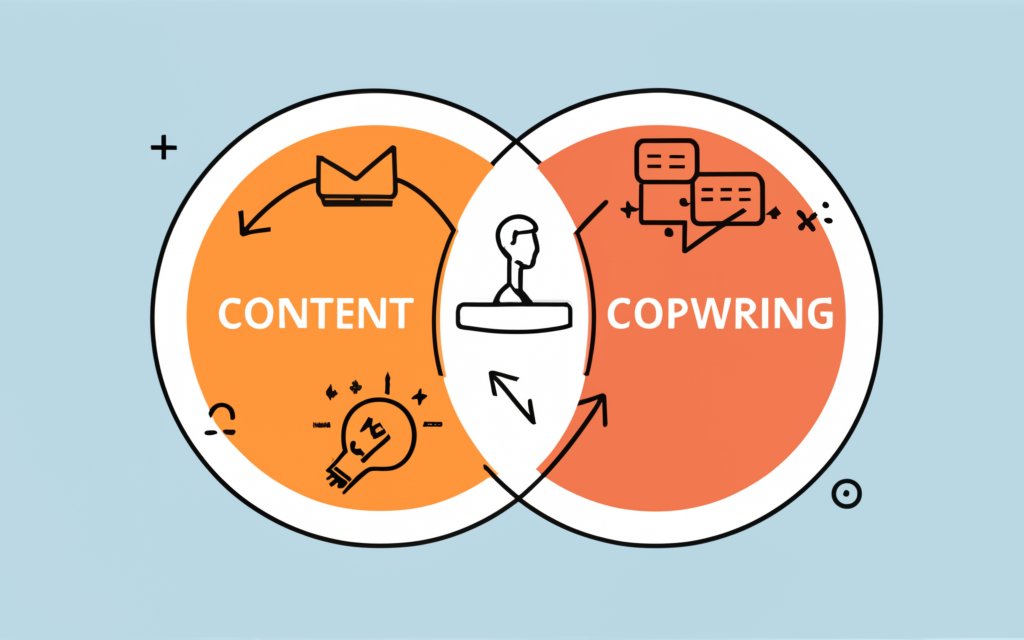Content Writing vs Copywriting is a debate many aspiring writers face, especially when deciding on a suitable career path in 2024. While both careers revolve around the art of written communication, each has unique purposes, skill requirements, and potential growth trajectories. This blog will dive deep into the distinctions between these two paths, helping you understand which one aligns best with your interests, skills, and long-term career goals. From understanding core differences and required skills to assessing daily responsibilities, we’ll guide you through the decision-making process step-by-step.
Estimated Reading Time: 12-15 minutes
Table of Contents

Content Writing vs Copywriting: Understanding the Core Differences
Basic Definitions
In exploring Content Writing vs Copywriting, it’s essential to start with a clear understanding of each field. Content Writing focuses on creating informative, engaging, and valuable content that educates or entertains a target audience. Articles, blogs, guides, and whitepapers are common forms of content writing, crafted to build a relationship with the reader over time. Copywriting, on the other hand, is the art of persuasive writing with a direct goal in mind—whether it’s prompting a sale, a click, or any specific action. Copywriting is often found in advertisements, landing pages, and emails, where concise language is used to drive immediate engagement.
Primary Objectives
One of the fundamental distinctions between content writing and copywriting lies in their objectives. Content writing aims to inform and educate, building trust and authority through well-researched, valuable information. This trust-building approach leads to long-term brand loyalty and increased organic traffic over time. Conversely, the primary goal of copywriting is to convert readers into customers. Every line in copywriting is strategically crafted to spark interest and lead the reader toward a clear call to action.
Target Audience Focus
In content writing, the audience focus is often broader, as content is tailored to inform readers who may or may not be familiar with a brand but are interested in a topic. Content writers seek to engage these readers with relevant, insightful information that aligns with their needs or interests. Copywriting, however, zeroes in on specific buyer personas, focusing on those more likely to take action based on the copy. This leads to targeted messaging crafted for maximum persuasion, often highlighting product benefits, unique selling points, or solutions to specific customer pain points.

Content Writing vs Copywriting Skills Comparison
Required Expertise
The skills required in Content Writing vs Copywriting vary to match the unique goals of each field. Content writers typically excel in research, as their work often involves compiling data, understanding trends, and translating complex topics into reader-friendly language. Content writers need to be skilled in creating long-form, informative pieces and maintaining an engaging narrative. Copywriters, on the other hand, need a flair for persuasive language and a keen understanding of consumer psychology. Their expertise lies in crafting short, impactful messages that resonate with the reader and prompt immediate action.
Writing Techniques
Writing techniques in content writing and copywriting differ significantly. Content writing often uses a conversational tone and focuses on creating an informative flow, maintaining reader interest over an extended period. Techniques like storytelling and value-based writing help establish trust. Copywriting, by contrast, relies heavily on attention-grabbing headlines, concise wording, and calls to action (CTAs). Techniques like emotional appeal, urgency, and benefit-oriented language are key in copywriting to influence the reader’s decision-making process.
Technical Knowledge
Technical knowledge is an essential aspect in comparing content writing and copywriting. Content writers benefit from SEO expertise, as much of their work needs to rank well in search engines to increase visibility. This means they must understand keyword research, meta descriptions, and content structuring for SEO. Copywriters, however, need a strong grasp of marketing concepts, including conversion rate optimization (CRO) and A/B testing, as their work is more conversion-focused. Additionally, knowledge of tools like Google Analytics, Facebook Ads, or email marketing platforms can be advantageous for copywriters to track and improve their results.

Career Paths: Content Writing vs Copywriting Opportunities
Job Prospects
When comparing Content Writing vs Copywriting in terms of job prospects, both fields offer extensive opportunities, though in distinct niches. Content writing roles are typically found in sectors like digital marketing, media, education, and publishing. Content writers often work as blog writers, technical writers, or social media content creators. Copywriters are highly sought after in advertising, sales, and branding roles, crafting persuasive messages for ad campaigns, emails, and product descriptions. Both career paths are increasingly available in freelance, part-time, and remote formats, offering flexibility for diverse working arrangements.
Industry Demand
The demand for content writing and copywriting varies by industry. Content writing is essential for companies prioritizing SEO and content marketing, where long-form, value-driven content helps build credibility and search engine presence. E-commerce, SaaS, and corporate sectors rely heavily on content writing to educate and inform customers. Copywriting, on the other hand, is in high demand across industries with a focus on direct sales and brand awareness. Businesses in retail, finance, tech, and startups need skilled copywriters to develop ad copy, email marketing, and sales funnels that drive conversions and promote products.
Growth Potential
The growth potential in content writing and copywriting depends on the writer’s ability to specialize and diversify their skills. Content writers can advance by developing expertise in SEO, technical writing, or niche-specific content (like finance or health), which can lead to higher-paying roles as content strategists or editors. Copywriters have strong growth prospects as well, with pathways to become creative directors, brand strategists, or senior copywriters. Both paths offer the opportunity to transition into roles such as content manager or digital marketing strategist, depending on skill expansion and industry trends.
Salary Expectations: Content Writing vs Copywriting Income
Entry-Level Pay
For individuals entering a content writing vs copywriting career, the entry-level salary can vary based on the industry and job type. Content writers typically start with a pay range from $30,000 to $45,000 annually, with entry-level roles available in digital marketing agencies, publications, or smaller companies focused on SEO and blog content. Copywriters often command a slightly higher entry salary, ranging from $35,000 to $50,000, as their work is directly tied to sales and revenue. Copywriting for advertising, marketing, or e-commerce tends to offer higher starting wages compared to general content writing roles.
Experience-Based Earnings
With experience, income for both content writers and copywriters can increase significantly. A mid-level content writer with specialized knowledge in areas like technical writing, SEO, or industry-specific topics (such as healthcare or finance) may earn between $50,000 and $70,000 annually. Senior content writers or strategists can earn upwards of $80,000. Copywriters, due to their role in driving revenue, often see a more accelerated income increase, with experienced copywriters earning between $60,000 and $90,000. Senior-level copywriters or creative leads can command six-figure salaries, especially within top advertising agencies or large corporations.
Freelance Potential
For both fields, freelancing offers substantial earning potential, particularly as experience and client bases grow. Freelance content writers generally charge between $0.10 and $0.50 per word or $30 to $100 per hour, depending on expertise and industry demand. Freelance copywriters often have higher rates due to the persuasive nature of their work, typically ranging from $0.20 to $1 per word or $50 to $150 per hour. Additionally, copywriters specializing in high-stakes content, like sales pages or email funnels, can charge premium rates. Freelancing allows both content writers and copywriters to build portfolios, increase rates over time, and earn a flexible, often lucrative income.

Daily Tasks: Content Writing vs Copywriting Responsibilities
Typical Projects
In a content writing role, professionals work on projects such as blog articles, long-form guides, e-books, and educational pieces. These projects often involve thorough research, understanding SEO keywords, and structuring content to be informative and engaging. Copywriters, on the other hand, focus on projects aimed at persuasion, such as creating ad copy, product descriptions, email campaigns, and landing pages. Their work is typically shorter in form but crafted with precise language to engage readers and drive conversions.
Work Environment
Content writers may work in environments where collaboration with SEO specialists and content strategists is essential. Their workspaces are generally quieter, as longer content creation demands focus and uninterrupted time. Copywriters, however, may frequently interact with marketing teams, product developers, and design staff to align copy with overall brand strategies. Fast-paced, dynamic settings are common for copywriters, especially in advertising or e-commerce, where quick turnarounds are needed to keep campaigns fresh and timely.
Time Management
Time management plays a key role for both content writers and copywriters but differs in emphasis. Content writers typically need to allocate time for research, drafting, and editing lengthy pieces, often working on multiple projects at different stages simultaneously. Meeting deadlines without compromising quality is essential. Copywriters often juggle shorter projects with quick deadlines, requiring efficiency and adaptability. Their focus on brevity means balancing word count limits with effectiveness, often revisiting and refining copy multiple times to achieve the ideal tone and impact.
Education Requirements: Content Writing vs Copywriting Training
Formal Education
For both content writing and copywriting, a degree in fields such as English, Communications, Marketing, or Journalism can provide a solid foundation. Content writers benefit from courses in literature, research methods, and creative writing, which help them develop storytelling skills and research competency. Copywriters, meanwhile, often find value in marketing-focused programs that cover persuasion, consumer psychology, and advertising principles, enabling them to create targeted, high-impact messages.
Certifications
Certifications offer an added advantage, especially for those without a formal background in writing. Content writers may choose certifications in SEO, content strategy, or digital marketing to build skills relevant to online content creation. Programs such as HubSpot’s Content Marketing Certification or SEMrush’s Content Marketing Toolkit can be valuable. Copywriters might opt for certifications in direct response copywriting, such as those offered by the American Writers & Artists Institute (AWAI), which focus on crafting persuasive and conversion-driven copy.
Essential Courses
Aside from formal education and certifications, certain courses can greatly enhance both content and copywriting skills. Content writers benefit from SEO-focused courses, such as those offered by Moz or Yoast, which teach keyword research and optimization. Courses in storytelling or social media content creation are also helpful. Copywriters should look into courses on digital marketing, persuasive writing, and brand voice, often found on platforms like Udemy, Coursera, and Skillshare. These courses enhance their understanding of brand messaging and help develop the ability to craft compelling calls to action.
Portfolio Building: Content Writing vs Copywriting Samples
Project Types
For aspiring content writers, a portfolio typically includes blog posts, informative articles, whitepapers, and social media posts. These samples show their ability to research, structure information, and engage readers on topics that add value and interest. For copywriters, the portfolio should focus on advertising materials such as ad copy, landing pages, email campaigns, and sales letters. These samples highlight their skill in crafting concise, persuasive text designed to prompt specific actions, whether it’s a click, a subscription, or a purchase.
Showcase Methods
For both fields, a personal website or portfolio platform (like Contently, Journo Portfolio, or Behance) is an excellent way to showcase work. Content writers might also link to published articles on third-party websites, showing real-world applications of their skills. Copywriters benefit from arranging their portfolio around key metrics or achievements, such as conversion rates or sales increases, to emphasize the effectiveness of their work. Including project briefs and context for each sample helps potential clients or employers understand their approach and results.
Client Expectations
Clients have different expectations depending on whether they’re hiring a content writer or a copywriter. Content writing clients look for consistency, depth, and knowledge in specific areas or industries, expecting writers to engage audiences with well-researched and insightful content. Copywriting clients, on the other hand, expect a keen understanding of the audience’s psychology and the ability to drive actions quickly. They often seek copywriters who can capture brand voice, create urgency, and adapt to varied campaign needs with high conversion potential.
Client Relationships: Content Writing vs Copywriting Approach
Communication Styles
In content writing, communication is often ongoing and collaborative, especially for long-term projects or editorial assignments. Content writers frequently discuss article topics, target audiences, and brand voice to align content with the client’s broader marketing goals. This approach emphasizes understanding industry insights and delivering informative, valuable material over time.
Copywriters, however, tend to focus on short, high-impact interactions with clients. Copywriting communication is direct and results-driven, focusing on the specific goal of each project, whether it’s increasing conversions, brand awareness, or customer engagement. Copywriters often work closely with marketing teams to fine-tune messages for specific campaigns and emphasize outcomes.
Project Management
Content writers typically handle multiple projects that may span various stages of development—from initial research to final editing and publishing. Strong project management skills, including organizing research, planning content calendars, and adhering to timelines, are essential in this role.
In copywriting, projects are often short-term but intense, requiring copywriters to meet tight deadlines and quickly adapt to client feedback. Copywriters need to manage timelines efficiently, often juggling various campaign assets simultaneously, such as ad copy, email series, and landing pages. Effective project management here means delivering high-impact content within short deadlines while maintaining message consistency.
Feedback Handling
Feedback styles vary significantly between content writing and copywriting. In content writing, feedback is often collaborative, with clients providing input on structure, tone, and engagement strategies to better align with brand goals. Revisions are part of the process, and content writers often adjust their drafts based on feedback to ensure value and audience relevance.
Copywriting feedback, however, is typically centered on the effectiveness of messaging. Clients may request specific changes to improve persuasive elements or calls to action, focusing on clarity, conciseness, and engagement power. Copywriters need to be receptive to detailed critiques, as even small adjustments can impact conversion rates. A successful copywriter refines their approach to match client objectives, ensuring the final product delivers the intended result.

Making Your Choice: Content Writing vs Copywriting Decision Guide
Self-Assessment
Choosing between content writing and copywriting starts with a self-assessment of your skills, interests, and personality. If you enjoy researching diverse topics and crafting informative, in-depth content, content writing might be a natural fit. Content writers are typically detail-oriented and enjoy developing their knowledge on various subjects.
In contrast, if you find satisfaction in creating short, impactful messages that drive specific actions, copywriting may align better with your strengths. Copywriters thrive on persuasion, creativity, and the challenge of crafting succinct, compelling content that speaks directly to a target audience.
Career Goals Alignment
Your long-term goals play a significant role in deciding between these paths. If you envision a career focused on educational, informative, or brand-building content across different platforms—like blogs, articles, and social media—content writing offers excellent opportunities. Content writers often work with companies focused on building thought leadership, nurturing audiences, and engaging readers over time.
For those who aim to work in marketing, sales, or advertising, copywriting offers a faster-paced, results-driven career path. Copywriting skills are in demand in fields that prioritize conversion, such as e-commerce, advertising, and direct marketing. With the right expertise, copywriters can also specialize in high-demand niches like ad copy, email marketing, and sales pages.
Next Steps
Once you’ve evaluated your skills and goals, it’s time to take actionable steps. If you’re leaning toward content writing, consider building a portfolio with blog posts, articles, or longer-form content. Look for freelance opportunities or internships to gain experience in creating engaging, informative material.
If copywriting feels like the right fit, focus on developing skills in persuasive language, brevity, and audience targeting. Craft a portfolio showcasing various short-form content, such as product descriptions, ad copy, or email campaigns. Practicing conversion-driven writing and studying effective marketing techniques will also give you an edge in this field.
Whether you choose content writing or copywriting, remember that both paths offer robust career growth and the chance to make an impact through words. Experiment with each type of writing to see what resonates most, and don’t hesitate to pivot if you find one path more fulfilling as you gain experience.
Conclusion
Choosing between content writing and copywriting as a career path ultimately depends on your personal strengths, career aspirations, and the type of impact you want to make through your writing. Both roles require creativity, adaptability, and a strong command of language, but each serves different objectives. Content writing is ideal for those who enjoy educating, engaging, and building long-term audience connections, whereas copywriting is geared toward crafting persuasive, action-driven content with immediate impact.
Whether you’re drawn to informative storytelling or compelling persuasion, taking the time to evaluate your skills, preferences, and professional goals will help you make an informed decision. Building a diverse portfolio, gaining practical experience, and honing essential skills for your chosen path will set you up for success in either field.
Remember, there’s also room for overlap, as many professionals find themselves blending both content and copywriting skills throughout their careers. With the right strategy and commitment to growth, you can thrive in either— or even both—of these dynamic writing careers.
References
- American Writers & Artists Institute (AWAI) – Insights on content writing vs. copywriting, including key skills and career paths.
- HubSpot Blog – Provides a comparison of content writing and copywriting for marketers, covering objectives, audience focus, and project types.
- Copyblogger – Articles on copywriting fundamentals, persuasive writing techniques, and how copywriting differs from content writing.
- Content Marketing Institute (CMI) – Covers content writing essentials, focusing on brand storytelling, strategies, and audience engagement.
- Glassdoor Salary Insights – Provides salary data and trends for content writers and copywriters, covering different experience levels and job types.
- Coursera and Udemy – Platforms offering courses and certifications in content writing and copywriting, including techniques and tools in each field.
These resources will give you a well-rounded view of the content writing vs. copywriting decision, covering necessary skills, educational options, and industry insights.




